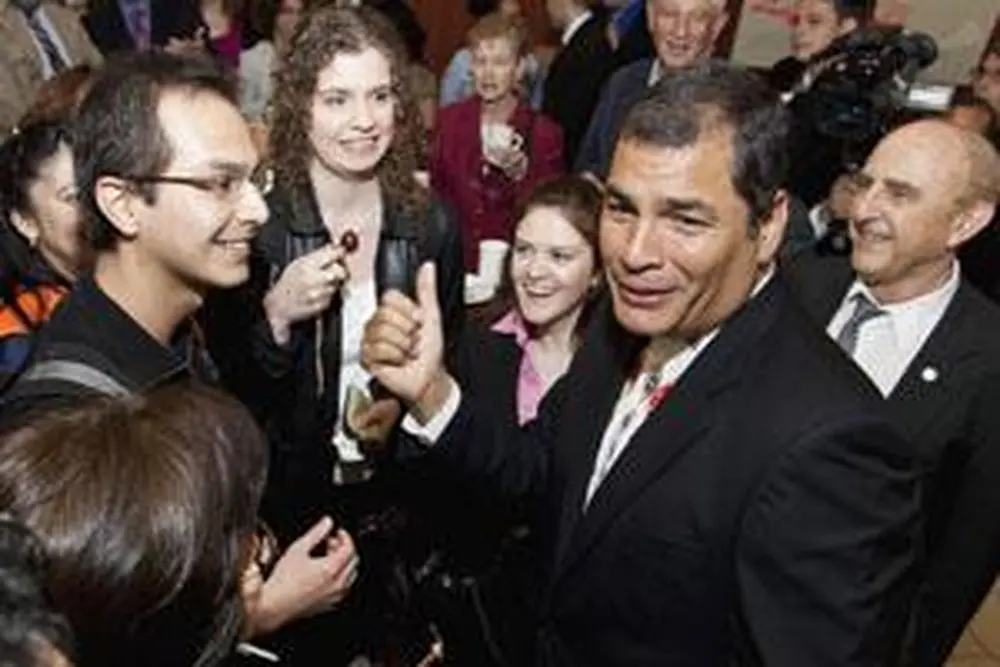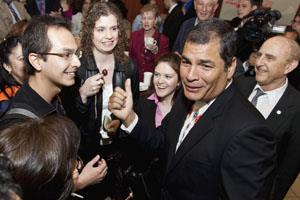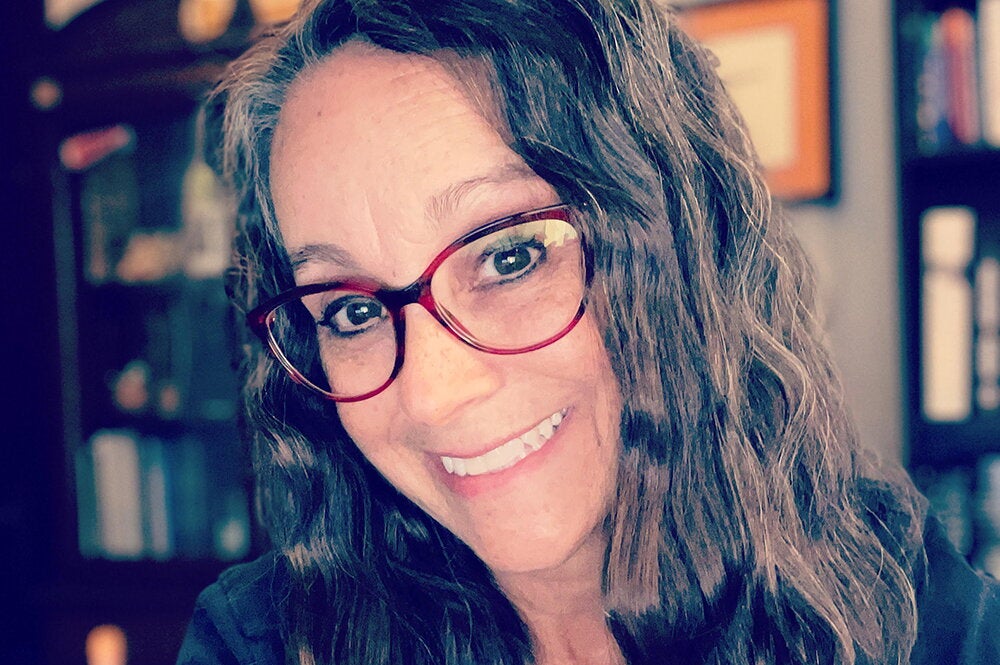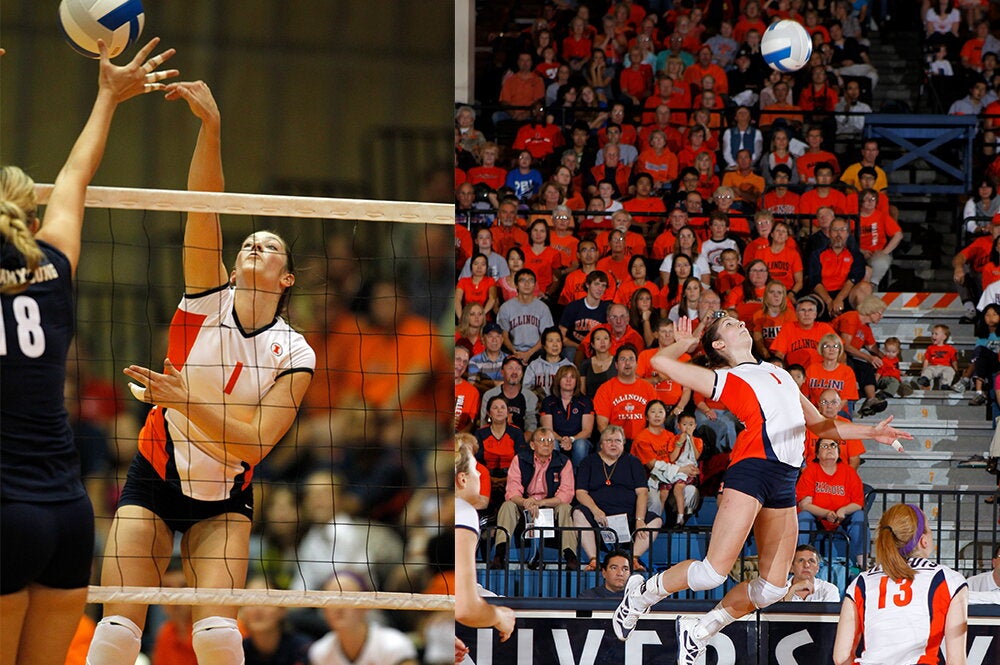

Displaying the charm and quick wit that have made him one of Latin America’s most charismatic leaders, Ecuadorian President and U of I alumnus Rafael Correa Delgado returned to campus last week to become one of the University’s most controversial alumni award recipients.
Correa was being honored with the Madhuri and Jagdish N. Sheth International Alumni Award for Exceptional Achievement, the first head of state to receive an alumni award from the campus. A 2001 PhD graduate in economics, Correa was recognized for his commitment to public service and his leadership in implementing economic development and political reforms in Ecuador.
In the three years since he assumed the presidency of Ecuador in 2007, Correa has doubled spending on education, healthcare, and infrastructure in what is one of Latin America’s poorest, most politically unstable countries. From 35 to 60 percent of the population lives in poverty, and the country had eight presidents in the decade prior to Correa. He has promoted plurinationalism, which recognizes cultural diversity and accords legal standing to indigenous customs. The new Ecuadorian constitution also recognizes ecosystem rights—the first constitution in the world that gives rights to nature.
These sweeping changes have won him widespread popularity in Latin America yet aroused angst in the United States. While remaking his country, he ordered the expulsion of a U.S. Immigration and Customs Enforcement attaché, renegotiated foreign debt payments to make his reforms feasible, and established relations with Cuba, Venezuela, and Iran.
In his acceptance speech at U of I, Correa made no apologies for his policies. Rather, he marshaled his prodigious rhetorical skills and delivered an often-poetic justification for his chosen path toward economic development.
“We are a people of peace,” he said. “For us, human beings—their well being, their good living—constitute the beginning and end of our actions. And to uphold these principals we are waging a democratic revolution we call the citizens’ revolution.... Latin American people are beginning to wake up from their slumber to take control of their own destiny.”
Taking control, he said, goes beyond acts of charity and begins with changing human behavior, especially values. For example, he said, “in Latin America, everyone wants to be the captain and nobody wants to be the sailor.” They practice a reactive form of solidarity rather than teamwork, he said, which prevents the kinds of organized, collective action necessary for socioeconomic progress.
Nor, he said, are his countrymen always willing to accept responsibility for mistakes. “If we make a mistake in Latin America, we throw stones at the U.S. Embassy.” This tendency to blame others impedes the rule of law, Correa said, because there is no investigation, no punishment, and no corrective action to prevent mistakes from occurring again.
Avoiding responsibility also fosters a culture of dependency, which Correa considers the greater failing. “We even invented a whole theory to blame others for our poverty...we are poor because you are rich.” To break this cycle, Correa believes that Latin Americans must accept that they are the main, though not only, ones responsible for their situation. “Otherwise, everybody will talk about change, but that is the others that need changing.”
Without a doubt, though, Correa believes others share blame for Latin America’s woes. He chided the “Washington Consensus,” a term that refers to economic policies prescribed in the 1990s for developing countries by such organizations as the World Bank and the International Monetary Fund. He said that their overemphasis on free-markets, privatization, and other neoliberal practices not only contributed to the current world recession but also are inappropriate for countries, like his, that face severe inequities in the distribution of wealth.
“I believe that the most important ethical imperative for humanity is to alleviate poverty, which for the first time in history is not the result of scarce resources but of perverse systems,” Correa said.
When asked about his relationship with Cuba and Iran, Correa stated bluntly that Ecuador is a sovereign country and does not have to ask permission to establish relations with any country in the world. He expressed anger at insinuations of terrorism and money laundering simply because his country cares about “selling our bananas to Iran.” (Bananas and oil are Ecuador’s leading exports.)
He also objected to accusations of limits on press freedom in his country. He said that the legislation he sponsored was trying to democratize media and counter the enormous power it wields in Latin America, where its practitioners can “lie” with impunity. He has established a government-run media in response.
Policy was not the only focus of Correa’s talk. He reminisced about his days at U of I, calling them the happiest time in his life. He also praised the “magnificent university” and the American educational system, which he called the best in the world. Correa brought his family with him for his “homecoming,” and during his couple days on campus visited with faculty and students.
“He was a model student, disciplined and determined,” according to his former professor and advisor, Werner Baer, who has trained a legion of economists at U of I, many of whom now hold leadership positions throughout the world, but especially in Latin America. Three former students are head of the central banks of Guatemala, Columbia, and Paraguay, and another is a director of the central bank of Brazil.


